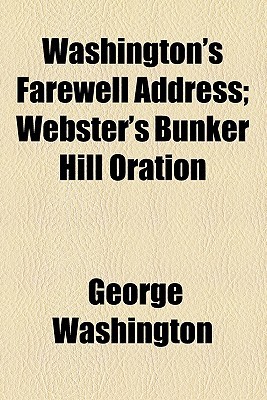- Bible
- Read the Bible
- Bible Versions
- Verse of the Day
- Reading Plans
- Verses by Topic
- Books of the Bible
- Bible Images
- Study
- Commentaries
- Concordances
- Dictionaries
- Encyclopedias
- Sermons
- Bible Atlas & Maps
- BP Wiki
- Devotionals
- Today's Devotionals
- Light of the World
- All Devotionals
- Inspirational Quotes
- More
- Picture Quotes
- Videos
- Inspirational
- Bible Study
- What The Bible Says
- Bible Q&As
- Daily Bread
- Bible by Genre
- Bible Stories
- Random Bible Verse
- Community
- Store
Washington's Farewell Address; Webster's Bunker Hill Oration
by George Washington
Book may have numerous typos, missing text, images, or index. Purchasers can download a free scanned copy of the original book (without typos) from the publisher. 1908. Excerpt: ... AN ADDRESS DELIVERED AT THE LAYING OP THE COUNER-WTONE OF THE BUNKER HILL MONUMENT THIS uncounted multitude before me, and around me, proves the feeling which the occasion has excited. These thousands of human faces, glowing with sympathy and joy, and, from the impulses of a common gratitude turned reverently to heaven, in this spacious temple of 5 the firmament, proclaim that the day, the place, and the purpose of our assembling have made a deep impression on our hearts. If, indeed, there be anything in local association fit to affect the mind of man, we need not strive to repress the 10 emotions which agitate us here. We are among the sepulchres of our fathers. We are on ground distinguished by their valor, their constancy, and the shedding of their blood. We are here, not to fix an uncertain date in our annals, nor to draw into notice an obscure and unknown 15 spot. If our humble purpose had never been conceived, if we ourselves had never been born, the 17th of June, 1775, would have been a day on which all subsequent history would have poured its light, and the eminence where we stand, a point of attraction to the eyes of successive 20 generations. But we are Americans. We live in what may be called the early age of this great continent; and we know that our posterity, through all time, are here to enjoy and suffer the allotments of humanity. We see before us a probable train of great events; we know that 25 our own fortunes have been happily cast; and it is natu ral, therefore, that we should be moved by the contemplation of occurrences which have guided our destiny before many of us were born, and settled the condition in which we should pass that portion of our existence which God 5 allows to men on earth. We do not read even of the discovery of this continent, without feelin...
BUY NOW
Paperback, 24 pages
Published January 1st 2012 by General Books (first published August 4th 2009)
© 2025 Bibleportal.com All rights reserved.

George Washington was the commander of the Continental Army in the American Revolutionary War (1775-1783) and served as the first President of the United States of America (1789-1797). For his central role in the formation of the United States, he is often referred to as the father of his country.
Washington was baptized into the Church of England. In 1765, when the Church of England was still the state religion, he served on the vestry (lay council) for his local church. Throughout his life, he spoke of the value of righteousness, and of seeking and offering thanks for the "blessings of Heaven."
The Electoral College elected Washington unanimously in 1789, and again in the 1792 election; he remains the only president to receive 100% of the electoral votes.
Washington proved an able administrator. An excellent delegator and judge of talent and character, he held regular cabinet meetings to debate issues before making a final decision. In handling routine tasks, he was "systematic, orderly, energetic, solicitous of the opinion of others but decisive, intent upon general goals and the consistency of particular actions with them.
Washington died in 1799. He has been consistently ranked by scholars as one of the greatest U.S. Presidents.
... Show more